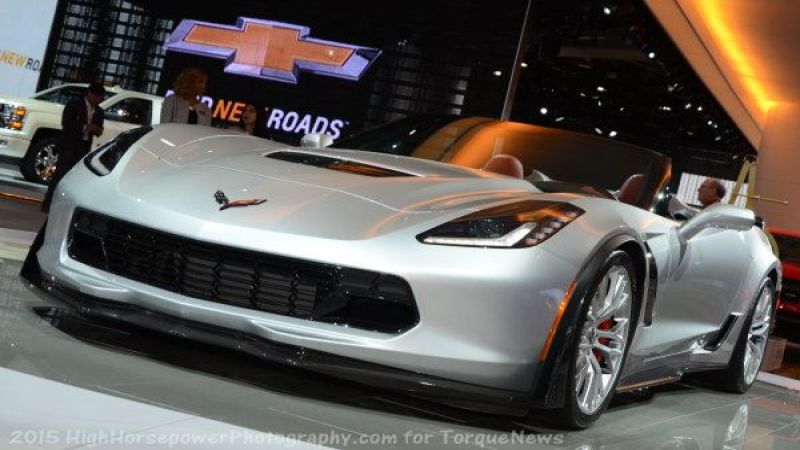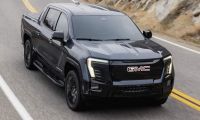The 2015 Chevrolet Corvette Z06 was introduced as the most track capable Corvette of all time and the heart of this beastly American supercar is the new LT4 V8. This mill delivers 650 horsepower and 650lb-ft of torque, making it the most powerful production road-going engine from General Motors ever. Even though the new Z06 is the heaviest Corvette ever, the supercharged engine, the super-aerodynamic body, the stiff-yet-light chassis, the high tech suspension system and the monster carbon ceramic brakes all work together to make the C7 Z06 one incredible machine.
Early Power Loss Issues
Unfortunately, shortly after GM began delivering the 2015 Corvette Z06, owners began experiencing a problem that they believe was major power loss from a condition known as “heat soak”. Heat soak is when the air intake system, including the supercharger, has gotten so hot that it is super-heating the air entering the engine. The computer detects this super-heated air and makes adjustments to prevent damage to the engine, which leads to a loss in power.
However, as soon as these reports of the noticeable power loss issues in the Corvette Z06 began popping up online, GM was quick to issue a statement that it wasn’t technically a heat soak issue. Instead, GM explained that the company had programmed the engine control computer to pull timing and power when the engine reaches the top end of its ideal operating temperature. This intention was to ensure that the new LT4 engine could make 650 horsepower reliably for the duration of the car’s warranty, but owners were noticing a power loss after just a few laps on the road course or a few long high speed highway runs.
In other words, the most track capable Corvette of all time was programmed to be less powerful after a relatively short time on the track. GM pointed out that this power loss could easily be programed out with an aftermarket engine tune, but that would void the engine warranty.
This has created a bit of a black eye for General Motors, while presenting an excellent marketing opportunity for the competitors, who regularly point out that their highest performance engines can run hard for hours on end without any power loss. At the same time, this questionable decision by General Motors built in a “simple” way for them to improve the C7 Corvette Z06.
The Hard Part of a Simple Issue
The fact that the 2015 Chevrolet Corvette Z06 pulls power after as little as a few road course laps on a hot day has proven to be a black eye for the automaker. The car is still selling fine, but those new Z06 owners who bought the “most track capable Corvette ever” to take it to the track are understandably upset about this. Even though the vast majority of Z06 owners will likely never be in a situation where this power loss issue really makes any difference, if you paid for a 650hp Corvette – you want a 650hp Corvette – so it isn’t hard to see the view of the upset owners. Also, with Dodge regularly pointing out that the Hellcat cars makes 707+ horsepower and the Dodge Viper makes 645hp, both without pulling power when hot and both with warranties, GM has plenty of incentive to get rid of this unfortunate feature of the new Z06.
The hard part is that it likely isn’t as easy as GM just removing that line of code from the engine control system, as if they put that power cut in the system of the 2015 Corvette Z06, they did so for a reason. Based on the basic ins and outs of a supercharged engine, I would imagine that when the engine gets hot, it begins to reach unsafe internal temperatures when producing 650 horsepower so in cutting the power, the computer is able to reduce the heat and internal stress on the engine.
If I am correct, GM would need to improve the cooling system of the LT4 V8 in the Corvette Z06, as if they can cut down internal temperatures, they could avoid risking damage when running at full power. That is the challenge for the GM engineering team, and it is one that I expect that they will solve in the coming years. Should they address this issue and get rid of the power loss, it would answer the complaints of Corvette racing loyalists while hushing those Ford and Chrysler fans who are happy to bring up videos of less powerful cars outrunning the most track capable Corvette of all time.
Set as google preferred source












Comments
The engine is operating
Permalink
The engine is operating within design parameters. The available peak horsepower is a marketing trick that exceeds sustainable horsepower. Think about the peak horsepower as the "sprint" power that you could use in a drag race. And then think about how much less speed you could sustain if you needed to run a marathon .. it's simply not possible to sustain a sprint speed for a marathon duration. Your body can't handle it! Same with the modern 'vette motors. GM figured out a way to provide both sprinting and endurance competence in the same package. But to accomplish that without destroying the heart of the beast, they have to knock the engine power back during endurance runs.
If you think about it, it's actually pretty darned smart .. a lot smarter technology than you'll find on 99% of the rest of the road-going vehicles.
What if Chevrolet would put
Permalink
What if Chevrolet would put Evans Waterless Coolant in their Z06's from the factory ?
Thanks
Ray
Awesome Web page, Keep up the
Permalink
In reply to What if Chevrolet would put by Raymond S Bargiel (not verified)
Awesome Web page, Keep up the useful work.
Thanks a lot.
click
Thousands of C7 Vert owners
Permalink
Thousands of C7 Vert owners would like the Windrestrictor® Brand Deflector approved and licensed for sale with flags and Stingray graphics.
They could utilize the
Permalink
They could utilize the aluminum frame to dissipate heat. Great conductor and high heat capacity.
I have a 2015 z51 stingray.
Permalink
I have a 2015 z51 stingray. Yesterday I headed out to Sears Point in Sonoma, Ca. Ran it with a group called Hooked On Driving. Warm day. Took it out 3 times 5-6 laps each top speed 120mph. Seemed o.k. except for popping sound last lap of third round. Then took it out for the 4th lap and had massive power loss off and on as well as popping. I would say there was one to two hours between laps. What do you think is up?
For a road worthy track car
Permalink
For a road worthy track car it should have been designed with this in mind, atleast have a "Track" mode where additional cooling fans kick in or more air venting opens up..... Ford Cars used peak power numbers only during "OverBoost" conditions and gives driver 20secs of peak power before it detunes itself until next time automatically. Seems most car makers are cheating anyways, especially with the Diesel engine class action suing going on.